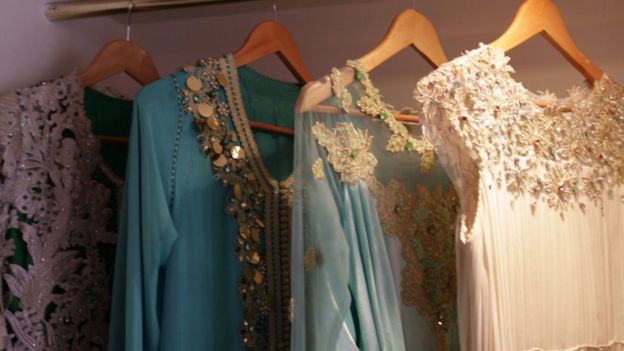The kaftans that give independence to Moroccan women
"I would watch the tailor," she says. "I would tell myself that one day I would love to design and make kaftans like him - but even better."
As a woman it was not easy starting up her own business in Morocco. The only daughter of a conservative family, she was not allowed to study abroad, but she was permitted to study fashion in the capital, Rabat.

After Ilham graduated, she started to make kaftans for her family in a spare room in their home in the Sale working class suburb outside the capital.
But soon she was catering for more than just her family and as the business expanded she moved downstairs to the basement. "It grew through word of mouth, more and more people wanted kaftans from me," she says.
Now aged 33, she has at least 10 women working for her and the kaftans sell for an average of €300 (£250) each, although, depending on the quality of the material and the time spent on making it, prices can run to thousands of euros.
In a country where a good middle-class family income is about €500, Ilham makes an above-average salary.
'Evolving' tradition
The kaftan industry is rooted in tradition. It is a black evening dresses uk for women that dates back to at least the 16th Century. But it is evolving - "just like Moroccan women", says Ilham.
With modern cuts, which some families may still frown upon, Ilham designs kaftans that mix European and Western influences.
They are part of the booming Moroccan textile sector, which accounts for 30% of the country's industrial employment and 15% of its exports.
Now that kaftans are moving from the domestic into the international market, their success is pulling women into the workforce. It is a good way to earn a respectable income, given the fact that a third of women in the country are unemployed.
"For women's independence these days, it's a lot easier compared with when I was growing up," says Ilham. "I wanted to work and fashion has always been a passion of mine, so I was going to still follow my passion no matter what my circumstances were."
Haute couture
In Marrakech, Morocco's tourist capital, 32-year-old Wafaa Redwani and her younger sister Sana have been running their own kaftan business for seven years with their Vallasco Gallery brand.
It is an haute couture boutique. Sana is the fashion designer and Wafaa manages the business. The kaftans here range in price from €200 to about €2,000. The business has been so successful they have opened up in Taroudant in the south of the country.
The kaftans have been modelled in Africa Fashion Week in New York and are exported to Portugal. Wafaa says the designs have a more Western cut with a "Moroccan touch", which explains why they are becoming more successful internationally.
The success of women like Ilham, Wafaa and Sana, demonstrates that Moroccan women are becoming more financially independent.
Female entrepreneurship
The president of the Democratic League for Women's Rights, Fouzia Assouli, is optimistic about women's opportunities in business, but says there is still a lot to be done.
"I think that there is a big emphasis on women entrepreneurship these days in the country," says Fouzia. "I believe it's thanks to Miriem Bensalah Chaqroun, who is president of the CGEM [business lobby group] and is one of the most influential businesswomen in Morocco and in Africa."
Fouzia believes that since Chaqroun was appointed it has opened doors for Moroccan women in the business sector. But she says there is more of an awareness of women's rights among the elite than among the poor, who are are still lagging behind.
However, she says the illiteracy rate of women in the countryside has fallen from 90% a few years ago, thanks to associations which help poor women to read and write and help them work.
Many of these vulnerable women are now collaborating with businesswomen like Ilham, Wafaa and Sana to help make kaftans - work which can sometimes take months to complete.
For Wafaa, the kaftan industry is a symbol of the Moroccan woman of today. "Our kaftans are like us. We are caught between the East and the West just like the designs, but we still have our Moroccan identity and we will still fight to move forward."
Read more:pink prom dresses



/http%3A%2F%2Fi.guim.co.uk%2Fimg%2Fmedia%2Fb8b7a90acedd856a45928fa10fb4b33042075cd6%2F0_384_5760_3456%2Fmaster%2F5760.jpg%3Fw%3D300%26q%3D55%26auto%3Dformat%26usm%3D12%26fit%3Dmax%26s%3D4ba88eb1e9b24182c94fd9418493dcb7)
/http%3A%2F%2Fpmcfootwearnews.files.wordpress.com%2F2016%2F12%2Fdevil-wears-prada-style-6.jpg%3Fw%3D1170)
/http%3A%2F%2Fmedia.allure.com%2Fphotos%2F57fbf18ba1167e136e6efad6%2Fmaster%2Fw_580%2Cc_limit%2FMarchesa%20Casati%20dior.jpg)
/https%3A%2F%2Fassets.over-blog.com%2Ft%2Fcedistic%2Fcamera.png)